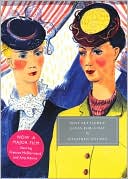Miss Pettigrew Lives for a Day
by Winifred Watson
Guinevere Pettigrew has never sworn—not even in her own head. She’s never told a black lie, and precious few white ones. And she’s never been kissed. Miss Pettigrew is a lady. Alas, she’s a down on her luck lady, currently between positions as a governess, and times are hard. It is with no small amount of desperation that she knocks at the address the employment agency supplied for an interview. After about five minutes of steady rapping, the door is flung open by a somewhat frenzied young woman in a negligée. Without so much as stopping to ask who she is, the woman breathlessly drags Miss Pettigrew into her drama-filled life. Her immediate goal is to ease her lover out the door gracefully before her other lover arrives. So begins a whirlwind romance—a romance between the older, wiser, but frightfully insecure Miss Pettigrew and the kind-hearted but flighty Delysia LaFloss, actress and nightclub singer.
Readers who saw the 2008 film of Winifred Watson’s obscure comedy, first published in 1938, may remember the opening I described. But after the first couple of scenes, the details of the novel diverge. What remains the same is the spirit of the tale, the absolutely heart-warming characters, and the delightful humor. I was amazed at how well the comedy held up. This book could have been written today—with one big caveat…
Simply put, 1938 was a different time, and it was more than a little jarring when these wonderful, winning characters would suddenly come out with something astonishingly racist or anti-Semitic. It happens several times, and at one point the charming male lead suggests the adorable female lead might be in need of some “physical correction” occasionally. You can’t ignore it, but you must overlook it. It was a different time.
And despite that one big caveat, this is a novel I have fallen head over heals in love with. You will be praying just as fervently as Miss Petigrew for the doorbell to ring just one more time, and to see what adventure lies around the next corner. For Miss Petigrew, until now, has had a sad, lonely life. She starts the day somewhat rigid and judgmental, and watching her grow and blossom as the chapters count down the hours of one extraordinary day “24” style is a joy that no reader should be denied.
I actually listened to Miss Pettigrew Lives for a Day as an unabridged audio book. It was read to perfection by Frances McDormand, the actress who brought Miss Pettigrew to life in the film. Her affection for the material must equal my own; I could hear the smile in her voice. In some ways, the novel reminds me of a racier, feminist counterpart to P.G. Wodehouse’s beloved Wooster and Jeeves tales. All I know is that this is the book I’m going to pull from the shelf the next time I’m in need of a pick-me-up. And I’m going to spend the next several decades haunting used book stores searching for an illustrated copy from the thirties. Miss Pettigrew has joined the ranks of my all-time favorites.

No comments:
Post a Comment